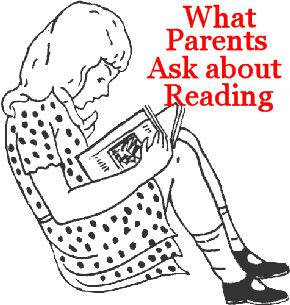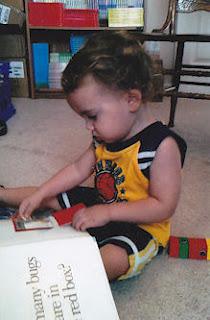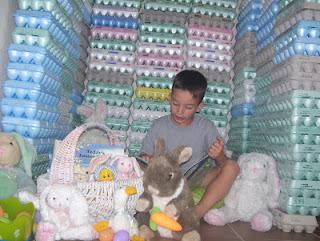Don't worry that your preschooler isn't reading! Please! Of course, it is wonderful to share books with your young children. Of course, it is great that they see and hear you reading. Your enthusiasm for reading is contagious and extremely helpful so children will develop a curiosity and love of books. But they may not be ready to focus on the letters, or be interested in flashcards or expensive phonics' programs. Let them be children and they will learn naturally when developmentally ready. As a former kindergarten and special education teacher, I often heard these questions from parents:

When do I start reading to my child? It is never too early to read to a child. Even small babies find pleasure in language. They enjoy being sung and read to, and they like it when you tell them stories and rhymes. They enjoy sitting on your lap sharing the bonding experience.
Is my child really reading or just memorizing? Young children often talk their way through a book using the pictures to guide them. They might use their own words or remember the story by heart. This is a beginning stage of reading. As children get older, the pictures continue to help them make good guesses about words they don't know. Keep encouraging them until they figure out phonics (letters have sounds), sounds blended form words, and the recognition of some sight words.
How many books a day should I read to my child? I recommend three or more books a day: one that rhymes, one of their choice (even if you have read it numerous times), a beginner's reading book with just a few words on each page, non-fiction or science books with wonderful photos, and whatever they may choose. But the main point is that they are interested in books so expose them to a variety such as traditional and modern stories, nursery rhymes, poetry, songs, and non-fiction books. If you, or your child, are too tired, ill, or stressed, do not make it a power struggle to have reading time. It needs to be enjoyable, relaxing, fun, and of interest to the child. Young children enjoy books with pull-up gadgets to maneuver, materials to feel, and sounds so that they can participate and experience the book through their senses of touch, sight and hearing.

Should I buy a phonics or reading program? It is not necessary. Many of us older readers learned without one. The key is the 3 Rs: repetition, rhythm and rhyme. You can borrow library books, purchase books that teach phonics, or make your own. There are numerous alphabet sheets available for free on the Internet that your child could color and put in a binder for a personalized alphabet book. Free sites are listed on my blog or just Google "free alphabet or phonics worksheets." There are even free beginning reading books. When I taught kindergarten, I preferred phonics programs that taught the most frequently used letters first, rather than teaching from the letter A through Z, because words can be learned more quickly. For example, teach the letter S making an sssssss sound like a snake. Teach the letter m by eating M&Ms and making the mmmm sound. Teach the word Sam. Read Dr. Seuss' book Green Eggs and Ham. Children love their name, so you may want to start with those letters.
How can I help my child learn to read? Use animated facial expressions and voice when you read to children. Let them see you reading books, magazines, shopping lists, kindles, nooks, and signs. We are surrounded by words in our environment. Point to signs and make it a game. The first words they may recognize are their name, stop from a stop sign, or a sign in front of a store that you frequent. The first word my nephew read at age three was zoo from an advertisement poster. When my grandson went grocery shopping with his mom, he pointed and yelled, "That spells grocery store!" He didn't know the name of the store, but knew those letters meant groceries. Praise your children whenever they notice and recognize letters and words. Help them learn the sound the letter makes by extending the sound.
Does my child understand what he or she is reading? Comprehension is important. Ask questions, listen, and answer their numerous questions. It shows they are interested and want to find out more. Talking about books is one of the best ways for children to become involved in stories, feel like readers, and increase their vocabulary. You can help children talk about a book by saying things like:
- I wonder what happened?
- Can you guess what is going to happen next?
- Why do you like this book so much?
- What is your favorite part of the book?
- Can you tell me the story in your own words?
- Can you make up a story about (whatever they love)?
 Children enjoy having a special reading space such as a tent with a flashlight or a blanket thrown over chairs. We even built one using egg cartons.The gift of reading continues throughout a lifetime.Parents, siblings, grandparents, great-grandparents, babysitters and teachers can be a part of wrapping a huge beautiful gift that when opened will unleash a lifetime of learning. Something about everything can be learned from reading. It is inspiring to know of people who were denied an education, but given the opportunity they learned to read in their senior years. The desire to read is phenomenal and is not quenched until achieved.
Children enjoy having a special reading space such as a tent with a flashlight or a blanket thrown over chairs. We even built one using egg cartons.The gift of reading continues throughout a lifetime.Parents, siblings, grandparents, great-grandparents, babysitters and teachers can be a part of wrapping a huge beautiful gift that when opened will unleash a lifetime of learning. Something about everything can be learned from reading. It is inspiring to know of people who were denied an education, but given the opportunity they learned to read in their senior years. The desire to read is phenomenal and is not quenched until achieved.There is more treasure in books than in all the pirate'sloot on Treasure Island. ~Walt Disney
Susan Case blogs at Kindergarten & Preschool for Parents &Teachers. For a glimpse into Kindergarten, see her book:Kindergarten: Tattle-Tales, Tools, Tactics, Triumphs and Tasty Treats for Teachers and Parents. Do you need playful learning activities for your preschooler while saving your sanity? Here is your answer! The Happy Mommy Handbook: The Ultimate How-to Guide on Keeping Your Toddlers and Preschoolers Busy, Out of Trouble and Motivated to Learn
